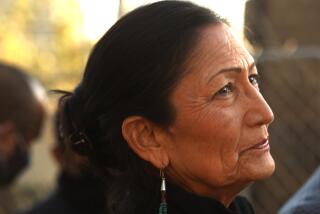Adoption Law Creates a No-Win Situation
- Share via
There is something basically wrong with a law that would force a young mother who wants to give up her baby for adoption to put the baby in a situation the mother deplores. An 18-year-old Cypress woman, faced with just such a prospect, has vowed to raise her baby herself rather than have that happen. That would be an unfortunate result of a good legal intention gone awry.
Jodi Argleben, who is unmarried, would like her 7-month-old daughter, Rebecca, to be adopted by a Canadian family. The Aleut Indians of Alaska--the tribe into which Argleben was born--have sued to stop the adoption under the Indian Child Welfare Act of 1978. If the tribe prevails, the baby will be sent to the Aleuts to be raised in the tiny fishing village of Akhiok on Kodiak Island.
Argleben was removed from Akhiok at 18 months of age--before passage of the law--after allegations of abuse and neglect were made against her parents. She was adopted by a non-Indian family that eventually settled in Orange County. But she has since revisited Akhiok and feels adamant about not having her daughter--whose father is of Swedish descent--raised there.
In a recent preliminary ruling, Orange County Superior Court Judge Robert J. Polis said the law gave the Aleut tribe a right to intervene in Rebecca’s adoption once Argleben decided to give her up. But Polis said he has “serious problems” with the law, which he believes violates the constitutional rights of the mother. He said the result is that the tribe can “dictate to a woman, literally reach into her womb, and take away a right from her.”
When approved by Congress, the Indian Child Welfare Act was designed to provide safeguards for Indian families in cases of involuntary adoption, according to Congressional Quarterly’s report at the time about the legislation. The act, CQ said, “was passed in response to complaints that state agencies were taking children from poor, uneducated Indian parents who did not know their rights.”
The act requires approval of tribal courts for adoptions of Indian children and court-appointed counsel for indigent parents or guardians in the proceedings, as well as other safeguards.
The Argleben case has been confused by a jurisdictional problem between the United States and Canada, where Argleben took her baby to be adopted to avoid application of the adoption law. At one point, a Canadian court ruled that it did not have jurisdiction over the case and referred it to the California court. But on Friday, a British Columbia appeals court took the case back and ordered that Rebecca remain with the Canadian couple that wants to adopt her until the legal issues are resolved.
Argleben’s attorney, Christian Van Deusen, said he will ask Polis at a hearing Monday to vacate his earlier ruling, pending the outcome of the proceedings in Canada. Van Deusen said that in any case he will ask Polis to reconsider his decision.
But no matter how the Argleben case ends up, there should also be a serious legislative review of the law that has put this young mother in a dilemma over the fate of her own baby.
More to Read
Sign up for Essential California
The most important California stories and recommendations in your inbox every morning.
You may occasionally receive promotional content from the Los Angeles Times.













